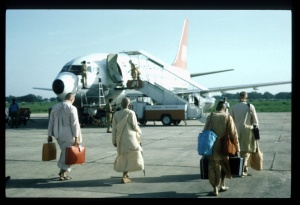CC Madhya 8.249: Difference between revisions
m (1 revision(s)) |
No edit summary |
||
| Line 1: | Line 1: | ||
{{ | [[Category:Sri Caitanya-caritamrta - Madhya-lila Chapter 08|C249]] | ||
<div style="float:left">'''[[Sri Caitanya-caritamrta|Śrī Caitanya-caritāmṛta]] - [[CC Madhya|Madhya-līlā]] - [[CC Madhya 8|Chapter 8: Talks Between Śrī Caitanya Mahāprabhu and Rāmānanda Rāya]]'''</div> | |||
<div style="float:right">[[File:Go-previous.png|link=CC Madhya 8.248|Madhya-līlā 8.248]] '''[[CC Madhya 8.248|Madhya-līlā 8.248]] - [[CC Madhya 8.250|Madhya-līlā 8.250]]''' [[File:Go-next.png|link=CC Madhya 8.250|Madhya-līlā 8.250]]</div> | |||
{{CompareVersions|CC|Madhya 8.249|CC 1975|CC 1996}} | |||
{{RandomImage}} | |||
==== TEXT 249 ==== | ==== TEXT 249 ==== | ||
<div | <div class="verse"> | ||
‘mukta-madhye kon jīva mukta kari’ māni?’ | :‘mukta-madhye kon jīva mukta kari’ māni?’ | ||
‘kṛṣṇa-prema yāṅra, sei mukta-śiromaṇi’ | :‘kṛṣṇa-prema yāṅra, sei mukta-śiromaṇi’ | ||
</div> | </div> | ||
| Line 12: | Line 16: | ||
==== SYNONYMS ==== | ==== SYNONYMS ==== | ||
<div | <div class="synonyms"> | ||
mukta- | ''mukta-madhye''—among the liberated; ''kon''—what; ''jīva''—living entity; ''mukta''—liberated; ''kari’''—considering as; ''māni''—We accept; ''kṛṣṇa-prema''—one who loves Kṛṣṇa; ''yāṅra''—of whom; ''sei''—such a person; ''mukta-śiromaṇi''—the topmost of all liberated souls. | ||
</div> | </div> | ||
| Line 19: | Line 23: | ||
==== TRANSLATION ==== | ==== TRANSLATION ==== | ||
<div | <div class="translation"> | ||
Śrī Caitanya Mahāprabhu then inquired, “Out of all liberated persons, who should be accepted as the greatest?” | Śrī Caitanya Mahāprabhu then inquired, “Out of all liberated persons, who should be accepted as the greatest?” | ||
Rāmānanda Rāya replied, “He who has love for Kṛṣṇa has attained the topmost liberation.” | Rāmānanda Rāya replied, “He who has love for Kṛṣṇa has attained the topmost liberation.” | ||
| Line 27: | Line 31: | ||
==== PURPORT ==== | ==== PURPORT ==== | ||
<div | <div class="purport"> | ||
In Śrīmad-Bhāgavatam ([[SB 6.14.5]]), it is said: | In [[Srimad-Bhagavatam|''Śrīmad-Bhāgavatam'']] ([[SB 6.14.5]]), it is said: | ||
:muktānām api siddhānāṁ nārāyaṇa-parāyaṇaḥ | :''muktānām api siddhānāṁ nārāyaṇa-parāyaṇaḥ'' | ||
:su-durlabhaḥ praśāntātmā koṭiṣv api mahā-mune | :''su-durlabhaḥ praśāntātmā koṭiṣv api mahā-mune'' | ||
“O great sage, of the many millions of liberated persons and of the millions who have attained perfection, he who is a devotee of Lord Nārāyaṇa is very, very rare. Indeed, he is the most perfect and peaceful person.” | “O great sage, of the many millions of liberated persons and of the millions who have attained perfection, he who is a devotee of Lord Nārāyaṇa is very, very rare. Indeed, he is the most perfect and peaceful person.” | ||
</div> | </div> | ||
__NOTOC__ | |||
<div style="float:right; clear:both;">[[File:Go-previous.png|link=CC Madhya 8.248|Madhya-līlā 8.248]] '''[[CC Madhya 8.248|Madhya-līlā 8.248]] - [[CC Madhya 8.250|Madhya-līlā 8.250]]''' [[File:Go-next.png|link=CC Madhya 8.250|Madhya-līlā 8.250]]</div> | |||
__NOTOC__ | |||
__NOEDITSECTION__ | |||
Revision as of 16:39, 19 August 2021

A.C. Bhaktivedanta Swami Prabhupada
TEXT 249
- ‘mukta-madhye kon jīva mukta kari’ māni?’
- ‘kṛṣṇa-prema yāṅra, sei mukta-śiromaṇi’
SYNONYMS
mukta-madhye—among the liberated; kon—what; jīva—living entity; mukta—liberated; kari’—considering as; māni—We accept; kṛṣṇa-prema—one who loves Kṛṣṇa; yāṅra—of whom; sei—such a person; mukta-śiromaṇi—the topmost of all liberated souls.
TRANSLATION
Śrī Caitanya Mahāprabhu then inquired, “Out of all liberated persons, who should be accepted as the greatest?” Rāmānanda Rāya replied, “He who has love for Kṛṣṇa has attained the topmost liberation.”
PURPORT
In Śrīmad-Bhāgavatam (SB 6.14.5), it is said:
- muktānām api siddhānāṁ nārāyaṇa-parāyaṇaḥ
- su-durlabhaḥ praśāntātmā koṭiṣv api mahā-mune
“O great sage, of the many millions of liberated persons and of the millions who have attained perfection, he who is a devotee of Lord Nārāyaṇa is very, very rare. Indeed, he is the most perfect and peaceful person.”